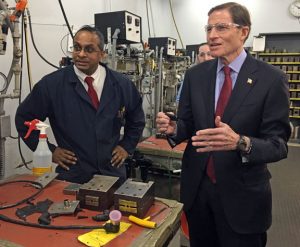
NAUGATUCK — United Avionics President Thomas Bunk can understand why some companies leave Connecticut for lower-cost states.
Though United Avionics’s customer base — Pratt & Whitney, Sikorsky Aircraft and United Technologies Aerospace Systems, to name a few — keeps the company in state, it’s feeling the squeeze of a workforce drought and rising manufacturing costs.
“Other states are actually soliciting us to move our business there; something comes up every month, every couple of months,” Bunk said. “We have no intention of doing it. However, there is a lot of activity from all these other lower-labor environments, lower-tax states, looking for businesses like ours, and I think they’re probably hitting the mark with some of Connecticut’s small businesses.”
He said the offers include tax cuts and abatements. According to the Connecticut Department of Labor’s July 2018 Economic Digest, Connecticut was the only state that continued to lose economic activity since the end of the recession, with gross state product down 9.1 percent between 2007 and 2017. Statewide output in the manufacturing sector fell 18.6 percent from 2007 to 2016.
On Monday, U.S. Sen. Richard Blumenthal, D-Conn., tied the labor shortage to the high cost of education during the question-and-answer session of his tour of the 22,000-square-foot plant at 38 Great Hill Road. Cheryl-Ann Muzyka, a line leader and certified IPC trainer, pointed out that advanced training programs and college educations are unaffordable for many Americans.
“We need to make sure that there are more grants and scholarships so that people don’t have debt, and if they’re going to borrow (public) money, it ought to be at a zero percent interest rate,” Blumenthal said.
Workers Monday were busy creating components on a well-lit manufacturing floor in rows of desks lined with personal calendars, fans and blueprints. United Avionics benefits from having a strong value-added department, according to engineer Omer Jalaludin, where wires and cables are placed into high temperature fluid resilient molds and casts with molding machines once owned by Uniroyal. The components will eventually find themselves in tanks, aircraft and even space suits.
The company, founded in 1981 in Beacon Falls, moved into a larger facility in the Naugatuck Industrial Park in 1991 to improve efficiency and access tax incentives.
Bunk said United Avionics, with a staff of 48 full-time employees and eight temporary workers, posted revenue gains of 30 percent from 2017 to 2018 and projects gains of 10 to 15 percent this year.
The problem will be filling those jobs, despite the fact that United Avionics has an in-house training program to meet its National Aerospace and Defense Contractors Accreditation Program specifications, a standard for special processes in manufacturing.
At one time, Bunk said, new workers lasted only a day or two. He blamed lack of motivation.
“It was so difficult,” he said.
United Avionics’ customers also hold the company to a higher quality control standard, which raises production costs without increasing the contracts’ value.
Blumenthal used no uncertain terms in casting the importance of state manufacturer’s ability to recruit workers.
“Connecticut has been the arsenal of democracy from the very beginning, going back to the Revolutionary War. It’s a proud tradition,” he said. “It’s not just that it’s Connecticut employees; it’s also our national defense that’s at stake.”













